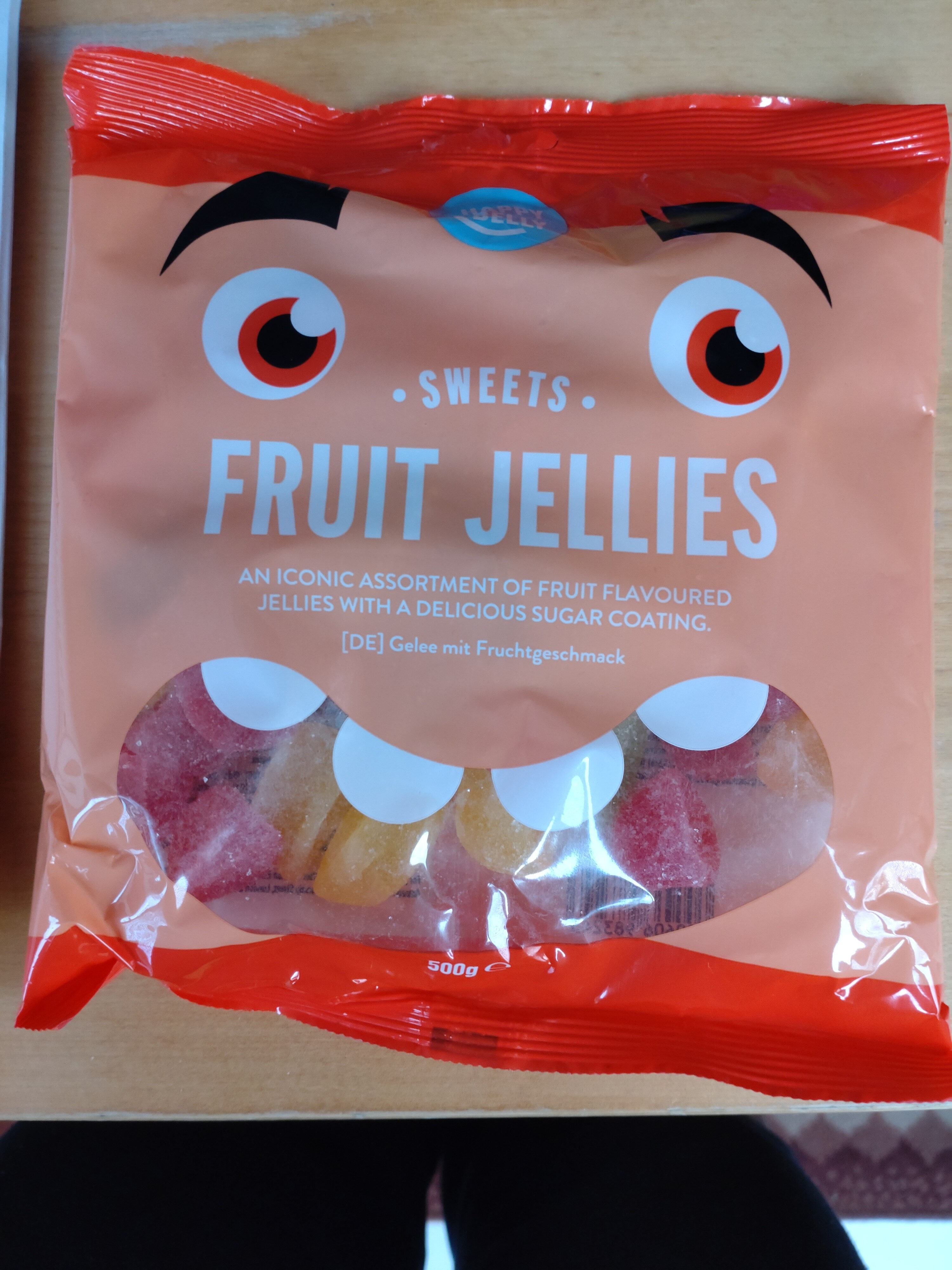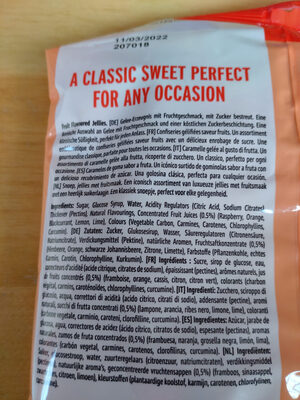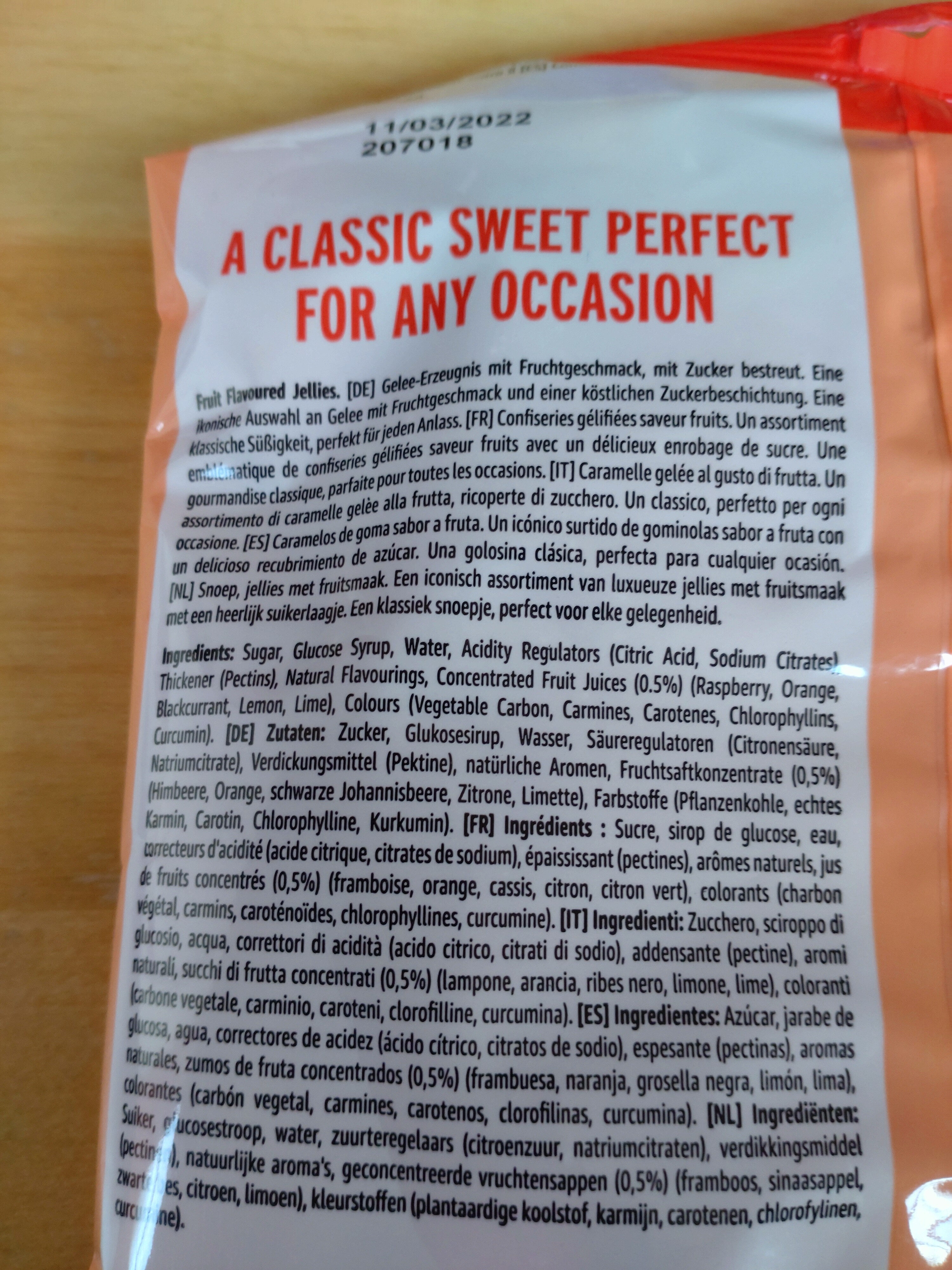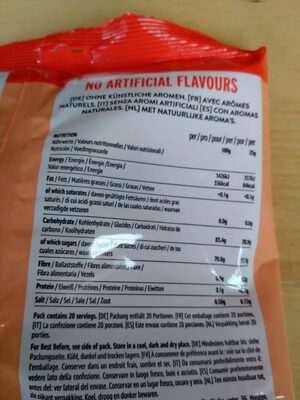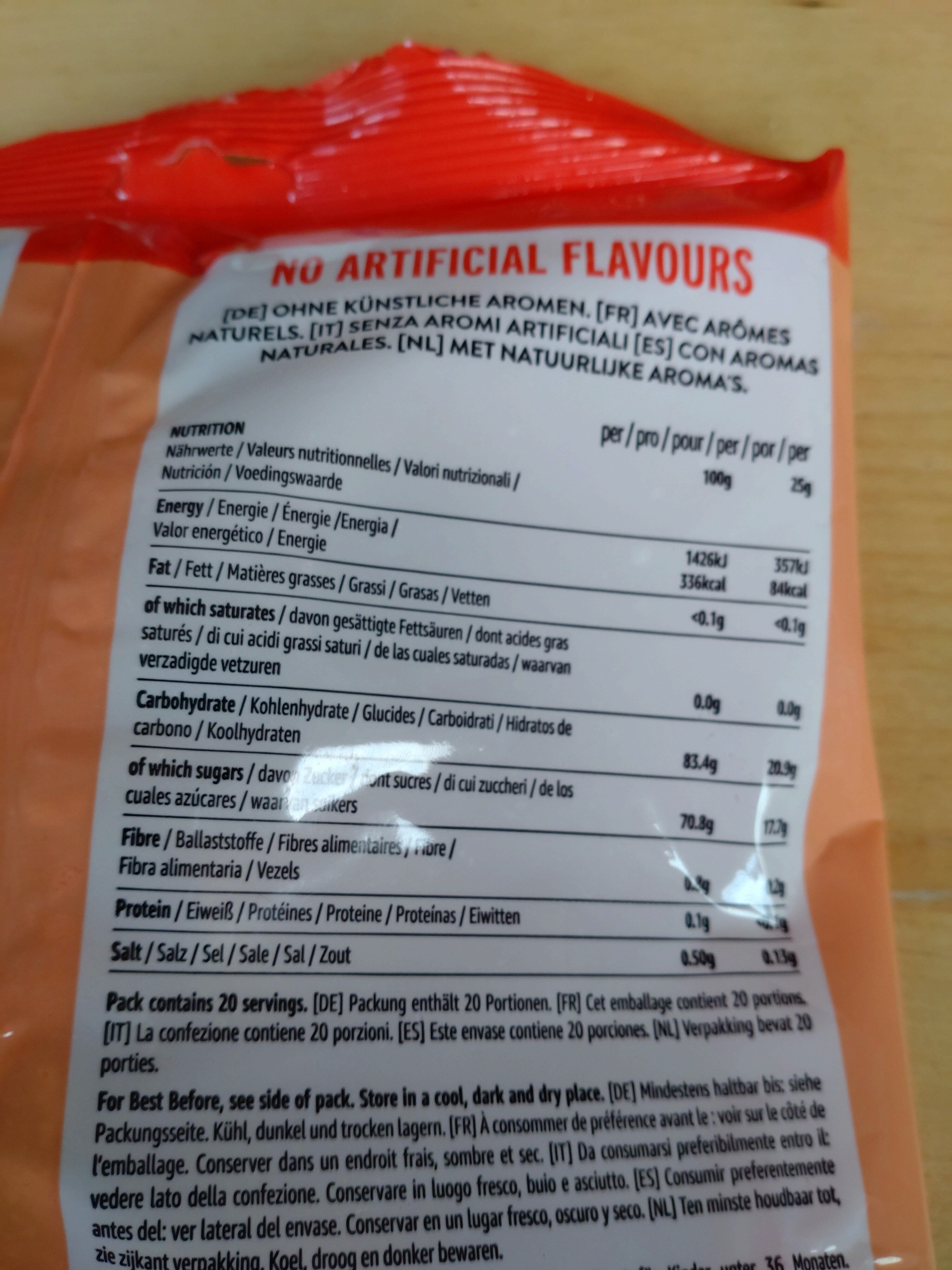Help us make food transparency the norm!
As a non-profit organization, we depend on your donations to continue informing consumers around the world about what they eat.
The food revolution starts with you!
Sweets Fruit Jellies - Happy Belly - 500g
Sweets Fruit Jellies - Happy Belly - 500g
This product page is not complete. You can help to complete it by editing it and adding more data from the photos we have, or by taking more photos using the app for Android or iPhone/iPad. Thank you!
×
Barcode: 5400606983243 (EAN / EAN-13)
Quantity: 500g
Packaging: Film
Brands: Happy Belly
Categories: Snacks, Sweet snacks, Confectioneries
Labels, certifications, awards: No artificial flavors, No flavors
Countries where sold: Germany
Matching with your preferences
Health
Ingredients
-
98 ingredients
: Zucker, Glukosesirup, Wasser, Säureregulatoren (Citronensäure, Natriumcitrate), Verdickungsmittel (Pektine), natürliche Aromen, Fruchtsaftkonzentrate (0,5%) (Himbeere, Orange, schwarze Johannisbeere, Zitrone, Limette), Farbstoffe (Pflanzenkohle, echtes Karmin, Carotin, Chlorophylline, Kurkumin). [FR] Ingrédients : Sucre, sirop de glucose, eau, Orrecteurs d'acidité (acide citrique, citrates de sodium), épaississant (pectines), arômes naturels, jus de fruits concentrés (0,5%) (framboise, orange, cassis, citron, citron vert), colorants (charbon végétal, carmins, caroténoïdes, chlorophyllines, curcumine). [IT] Ingredienti: Zucchero, sciroppo di gucosio, acqua, correttori di acidità (acido citrico, citrati di sodio), addensante (pectine), aromi eturali, succhi di frutta concentrati (0,5%) (lampone, arancia, ribes nero, limone, lime), coloranti karbone vegetale, carminio, caroteni, clorofilline, curcumina). [ES] Ingredientes: Azúcar, jarabe de gucosa, agua, correctores de acidez (ácido cítrico, citratos de sodio), espesante (pectinas), aromas laturales, zumos de fruta concentrados (0,5%) (frambuesa, naranja, grosella negra, limôn, lima), arantes (carbón vegetal, carmines, carotenos, clorofilinas, curcumina). [NL) Ingredienten: ucosestroop, water, zuurteregelaars (citroenzuur, natriumcitraten), verdikkingsmiddel Dectin, natuurlijke aroma's, geconcentreerde vruchtensappen (0,5%) (framboos, sinaasappel, Qurcu ne).Allergens: Orange
Food processing
-
Ultra processed foods
Elements that indicate the product is in the 4 - Ultra processed food and drink products group:
- Additive: E100 - Curcumin
- Additive: E120 - Cochineal
- Additive: E140 - Chlorophylls and Chlorophyllins
- Additive: E153 - Vegetable carbon
- Additive: E160a - Carotene
- Additive: E440 - Pectins
- Ingredient: Colour
- Ingredient: Flavouring
- Ingredient: Glucose
- Ingredient: Glucose syrup
- Ingredient: Thickener
Food products are classified into 4 groups according to their degree of processing:
- Unprocessed or minimally processed foods
- Processed culinary ingredients
- Processed foods
- Ultra processed foods
The determination of the group is based on the category of the product and on the ingredients it contains.
Additives
-
E120 - Cochineal
Carminic acid: Carminic acid -C22H20O13- is a red glucosidal hydroxyanthrapurin that occurs naturally in some scale insects, such as the cochineal, Armenian cochineal, and Polish cochineal. The insects produce the acid as a deterrent to predators. An aluminum salt of carminic acid is the coloring agent in carmine. Synonyms are C.I. 75470 and C.I. Natural Red 4. The chemical structure of carminic acid consists of a core anthraquinone structure linked to a glucose sugar unit. Carminic acid was first synthesized in the laboratory by organic chemists in 1991.Source: Wikipedia
-
E140 - Chlorophylls and Chlorophyllins
Chlorophyll d: Chlorophyll d is a form of chlorophyll, identified by Harold Strain and Winston Manning in 1943. It is present in cyanobacteria which use energy captured from sunlight for photosynthesis. Chlorophyll d absorbs far-red light, at 710 nm wavelength, just outside the optical range. An organism that contains chlorophyll d is adapted to an environment such as moderately deep water, where it can use far red light for photosynthesis, although there is not a lot of visible light.Source: Wikipedia
-
E140ii - Chlorophyllins
Chlorophyll d: Chlorophyll d is a form of chlorophyll, identified by Harold Strain and Winston Manning in 1943. It is present in cyanobacteria which use energy captured from sunlight for photosynthesis. Chlorophyll d absorbs far-red light, at 710 nm wavelength, just outside the optical range. An organism that contains chlorophyll d is adapted to an environment such as moderately deep water, where it can use far red light for photosynthesis, although there is not a lot of visible light.Source: Wikipedia
-
E160a - Carotene
Carotene: The term carotene -also carotin, from the Latin carota, "carrot"- is used for many related unsaturated hydrocarbon substances having the formula C40Hx, which are synthesized by plants but in general cannot be made by animals -with the exception of some aphids and spider mites which acquired the synthesizing genes from fungi-. Carotenes are photosynthetic pigments important for photosynthesis. Carotenes contain no oxygen atoms. They absorb ultraviolet, violet, and blue light and scatter orange or red light, and -in low concentrations- yellow light. Carotenes are responsible for the orange colour of the carrot, for which this class of chemicals is named, and for the colours of many other fruits, vegetables and fungi -for example, sweet potatoes, chanterelle and orange cantaloupe melon-. Carotenes are also responsible for the orange -but not all of the yellow- colours in dry foliage. They also -in lower concentrations- impart the yellow coloration to milk-fat and butter. Omnivorous animal species which are relatively poor converters of coloured dietary carotenoids to colourless retinoids have yellowed-coloured body fat, as a result of the carotenoid retention from the vegetable portion of their diet. The typical yellow-coloured fat of humans and chickens is a result of fat storage of carotenes from their diets. Carotenes contribute to photosynthesis by transmitting the light energy they absorb to chlorophyll. They also protect plant tissues by helping to absorb the energy from singlet oxygen, an excited form of the oxygen molecule O2 which is formed during photosynthesis. β-Carotene is composed of two retinyl groups, and is broken down in the mucosa of the human small intestine by β-carotene 15‚15'-monooxygenase to retinal, a form of vitamin A. β-Carotene can be stored in the liver and body fat and converted to retinal as needed, thus making it a form of vitamin A for humans and some other mammals. The carotenes α-carotene and γ-carotene, due to their single retinyl group -β-ionone ring-, also have some vitamin A activity -though less than β-carotene-, as does the xanthophyll carotenoid β-cryptoxanthin. All other carotenoids, including lycopene, have no beta-ring and thus no vitamin A activity -although they may have antioxidant activity and thus biological activity in other ways-. Animal species differ greatly in their ability to convert retinyl -beta-ionone- containing carotenoids to retinals. Carnivores in general are poor converters of dietary ionone-containing carotenoids. Pure carnivores such as ferrets lack β-carotene 15‚15'-monooxygenase and cannot convert any carotenoids to retinals at all -resulting in carotenes not being a form of vitamin A for this species-; while cats can convert a trace of β-carotene to retinol, although the amount is totally insufficient for meeting their daily retinol needs.Source: Wikipedia
-
E330 - Citric acid
Citric acid is a natural organic acid found in citrus fruits such as lemons, oranges, and limes.
It is widely used in the food industry as a flavor enhancer, acidulant, and preservative due to its tart and refreshing taste.
Citric acid is safe for consumption when used in moderation and is considered a generally recognized as safe (GRAS) food additive by regulatory agencies worldwide.
-
E331 - Sodium citrates
Sodium citrate: Sodium citrate may refer to any of the sodium salts of citrate -though most commonly the third-: Monosodium citrate Disodium citrate Trisodium citrateThe three forms of the salt are collectively known by the E number E331. Sodium citrates are used as acidity regulators in food and drinks, and also as emulsifiers for oils. They enable cheeses to melt without becoming greasy.Source: Wikipedia
-
E440 - Pectins
Pectins (E440) are natural carbohydrates, predominantly found in fruits, that act as gelling agents in the food industry, creating the desirable jelly-like texture in jams, jellies, and marmalades.
Pectins stabilize and thicken various food products, such as desserts, confectioneries, and beverages, ensuring a uniform consistency and quality.
Recognized as safe by various health authorities, pectins have been widely used without notable adverse effects when consumed in typical dietary amounts.
Ingredients analysis
-
May contain palm oil
Ingredients that may contain palm oil: E160a
-
Non-vegan
Non-vegan ingredients: E120Some ingredients could not be recognized.
We need your help!
You can help us recognize more ingredients and better analyze the list of ingredients for this product and others:
- Edit this product page to correct spelling mistakes in the ingredients list, and/or to remove ingredients in other languages and sentences that are not related to the ingredients.
- Add new entries, synonyms or translations to our multilingual lists of ingredients, ingredient processing methods, and labels.
If you would like to help, join the #ingredients channel on our Slack discussion space and/or learn about ingredients analysis on our wiki. Thank you!
-
Non-vegetarian
Non-vegetarian ingredients: E120Some ingredients could not be recognized.
We need your help!
You can help us recognize more ingredients and better analyze the list of ingredients for this product and others:
- Edit this product page to correct spelling mistakes in the ingredients list, and/or to remove ingredients in other languages and sentences that are not related to the ingredients.
- Add new entries, synonyms or translations to our multilingual lists of ingredients, ingredient processing methods, and labels.
If you would like to help, join the #ingredients channel on our Slack discussion space and/or learn about ingredients analysis on our wiki. Thank you!
-
Details of the analysis of the ingredients
We need your help!
Some ingredients could not be recognized.
We need your help!
You can help us recognize more ingredients and better analyze the list of ingredients for this product and others:
- Edit this product page to correct spelling mistakes in the ingredients list, and/or to remove ingredients in other languages and sentences that are not related to the ingredients.
- Add new entries, synonyms or translations to our multilingual lists of ingredients, ingredient processing methods, and labels.
If you would like to help, join the #ingredients channel on our Slack discussion space and/or learn about ingredients analysis on our wiki. Thank you!
: Zucker, Glukosesirup, Wasser, Säureregulatoren (Citronensäure, Natriumcitrate), Verdickungsmittel (Pektine), natürliche Aromen, Fruchtsaft 0.5% (Himbeere, Orange, schwarze Johannisbeere, Zitrone, Limette), Farbstoffe (Pflanzenkohle, echtes Karmin, Carotin, Chlorophylline, Kurkumin), Ingrédients (Sucre), sirop de glucose, eau, Orrecteurs d'acidité (acide citrique, citrates de sodium), épaississant (pectines), arômes naturels, jus de fruits concentrés 0.5% (framboise, orange, cassis, citron, citron vert), colorants (charbon végétal, carmins, caroténoïdes, chlorophyllines, curcumine), Ingredienti (Zucchero), sciroppo di gucosio, acqua, correttori di acidità (acido citrico, citrati di sodio), addensante (pectine), aromi eturali, succhi di frutta concentrati 0.5% (lampone, arancia, ribes nero, limone, lime), coloranti karbone vegetale, carminio, caroteni, clorofilline, curcumina, Ingredientes (Azúcar), jarabe de gucosa, agua, correctores de acidez (ácido cítrico, citratos de sodio), espesante (pectinas), aromas laturales, zumos de fruta concentrados 0.5% (frambuesa, naranja, grosella negra, limôn, lima), arantes (carbón vegetal, carmines, carotenos, clorofilinas, curcumina), NL) Ingredienten (ucosestroop), water, zuurteregelaars (citroenzuur, natriumcitraten), verdikkingsmiddel Dectin, natuurlijke aroma's, geconcentreerde vruchtensappen 0.5% (framboos, sinaasappel, Qurcu ne)- Zucker -> en:sugar - vegan: yes - vegetarian: yes - ciqual_proxy_food_code: 31016 - percent_min: 2.38095238095238 - percent_max: 79.5
- Glukosesirup -> en:glucose-syrup - vegan: yes - vegetarian: yes - ciqual_proxy_food_code: 31016 - percent_min: 0.5 - percent_max: 40
- Wasser -> en:water - vegan: yes - vegetarian: yes - ciqual_food_code: 18066 - percent_min: 0.5 - percent_max: 26.8333333333333
- Säureregulatoren -> en:acidity-regulator - percent_min: 0.5 - percent_max: 20.25
- Citronensäure -> en:e330 - vegan: yes - vegetarian: yes - percent_min: 0.25 - percent_max: 20.25
- Natriumcitrate -> en:e331 - vegan: yes - vegetarian: yes - percent_min: 0 - percent_max: 10.125
- Verdickungsmittel -> en:thickener - percent_min: 0.5 - percent_max: 16.3
- Pektine -> en:e440a - vegan: yes - vegetarian: yes - percent_min: 0.5 - percent_max: 16.3
- natürliche Aromen -> en:natural-flavouring - vegan: maybe - vegetarian: maybe - percent_min: 0.5 - percent_max: 5
- Fruchtsaft -> en:fruit-juice - vegan: yes - vegetarian: yes - percent_min: 0.5 - percent: 0.5 - percent_max: 0.5
- Himbeere -> en:raspberry - vegan: yes - vegetarian: yes - ciqual_food_code: 13015 - percent_min: 0 - percent_max: 0.5
- Orange -> en:orange - vegan: yes - vegetarian: yes - ciqual_proxy_food_code: 13034 - percent_min: 0 - percent_max: 0.25
- schwarze Johannisbeere -> en:blackcurrant - vegan: yes - vegetarian: yes - ciqual_food_code: 13007 - percent_min: 0 - percent_max: 0.166666666666667
- Zitrone -> en:lemon - vegan: yes - vegetarian: yes - ciqual_proxy_food_code: 13009 - percent_min: 0 - percent_max: 0.125
- Limette -> en:lime - vegan: yes - vegetarian: yes - ciqual_food_code: 13067 - percent_min: 0 - percent_max: 0.1
- Farbstoffe -> en:colour - percent_min: 0.5 - percent_max: 0.5
- Pflanzenkohle -> en:e153 - vegan: yes - vegetarian: yes - percent_min: 0 - percent_max: 0.5
- echtes Karmin -> en:e120 - vegan: no - vegetarian: no - percent_min: 0 - percent_max: 0.25
- Carotin -> en:e160a - vegan: maybe - vegetarian: maybe - from_palm_oil: maybe - percent_min: 0 - percent_max: 0.166666666666667
- Chlorophylline -> en:e140ii - vegan: yes - vegetarian: yes - percent_min: 0 - percent_max: 0.125
- Kurkumin -> en:e100 - vegan: yes - vegetarian: yes - percent_min: 0 - percent_max: 0.1
- Ingrédients -> de:ingrédients - percent_min: 0.5 - percent_max: 0.5
- Sucre -> de:sucre - percent_min: 0.5 - percent_max: 0.5
- sirop de glucose -> de:sirop-de-glucose - percent_min: 0.5 - percent_max: 0.5
- eau -> de:eau - percent_min: 0.5 - percent_max: 0.5
- Orrecteurs d'acidité -> de:orrecteurs-d-acidité - percent_min: 0.5 - percent_max: 0.5
- acide citrique -> de:acide-citrique - percent_min: 0.25 - percent_max: 0.5
- citrates de sodium -> de:citrates-de-sodium - percent_min: 0 - percent_max: 0.25
- épaississant -> de:épaississant - percent_min: 0.5 - percent_max: 0.5
- pectines -> de:pectines - percent_min: 0.5 - percent_max: 0.5
- arômes naturels -> de:arômes-naturels - percent_min: 0.5 - percent_max: 0.5
- jus de fruits concentrés -> de:jus-de-fruits-concentrés - percent_min: 0.5 - percent: 0.5 - percent_max: 0.5
- framboise -> de:framboise - percent_min: 0 - percent_max: 0.5
- orange -> en:orange - vegan: yes - vegetarian: yes - ciqual_proxy_food_code: 13034 - percent_min: 0 - percent_max: 0.25
- cassis -> de:cassis - percent_min: 0 - percent_max: 0.166666666666667
- citron -> de:citron - percent_min: 0 - percent_max: 0.125
- citron vert -> de:citron-vert - percent_min: 0 - percent_max: 0.1
- colorants -> de:colorants - percent_min: 0.5 - percent_max: 0.5
- charbon végétal -> de:charbon-végétal - percent_min: 0 - percent_max: 0.5
- carmins -> de:carmins - percent_min: 0 - percent_max: 0.25
- caroténoïdes -> de:caroténoïdes - percent_min: 0 - percent_max: 0.166666666666667
- chlorophyllines -> de:chlorophyllines - percent_min: 0 - percent_max: 0.125
- curcumine -> de:curcumine - percent_min: 0 - percent_max: 0.1
- Ingredienti -> de:ingredienti - percent_min: 0.5 - percent_max: 0.5
- Zucchero -> de:zucchero - percent_min: 0.5 - percent_max: 0.5
- sciroppo di gucosio -> de:sciroppo-di-gucosio - percent_min: 0.5 - percent_max: 0.5
- acqua -> de:acqua - percent_min: 0.5 - percent_max: 0.5
- correttori di acidità -> de:correttori-di-acidità - percent_min: 0.5 - percent_max: 0.5
- acido citrico -> de:acido-citrico - percent_min: 0.25 - percent_max: 0.5
- citrati di sodio -> de:citrati-di-sodio - percent_min: 0 - percent_max: 0.25
- addensante -> de:addensante - percent_min: 0.5 - percent_max: 0.5
- pectine -> de:pectine - percent_min: 0.5 - percent_max: 0.5
- aromi eturali -> de:aromi-eturali - percent_min: 0.5 - percent_max: 0.5
- succhi di frutta concentrati -> de:succhi-di-frutta-concentrati - percent_min: 0.5 - percent: 0.5 - percent_max: 0.5
- lampone -> de:lampone - percent_min: 0 - percent_max: 0.5
- arancia -> de:arancia - percent_min: 0 - percent_max: 0.25
- ribes nero -> de:ribes-nero - percent_min: 0 - percent_max: 0.166666666666667
- limone -> en:lime - vegan: yes - vegetarian: yes - ciqual_food_code: 13067 - percent_min: 0 - percent_max: 0.125
- lime -> de:lime - percent_min: 0 - percent_max: 0.1
- coloranti karbone vegetale -> de:coloranti-karbone-vegetale - percent_min: 0.5 - percent_max: 0.5
- carminio -> de:carminio - percent_min: 0.5 - percent_max: 0.5
- caroteni -> de:caroteni - percent_min: 0.5 - percent_max: 0.5
- clorofilline -> de:clorofilline - percent_min: 0.5 - percent_max: 0.5
- curcumina -> de:curcumina - percent_min: 0.5 - percent_max: 0.5
- Ingredientes -> de:ingredientes - percent_min: 0.5 - percent_max: 0.5
- Azúcar -> de:azúcar - percent_min: 0.5 - percent_max: 0.5
- jarabe de gucosa -> de:jarabe-de-gucosa - percent_min: 0.5 - percent_max: 0.5
- agua -> de:agua - percent_min: 0.5 - percent_max: 0.5
- correctores de acidez -> de:correctores-de-acidez - percent_min: 0.5 - percent_max: 0.5
- ácido cítrico -> de:ácido-cítrico - percent_min: 0.25 - percent_max: 0.5
- citratos de sodio -> de:citratos-de-sodio - percent_min: 0 - percent_max: 0.25
- espesante -> de:espesante - percent_min: 0.5 - percent_max: 0.5
- pectinas -> de:pectinas - percent_min: 0.5 - percent_max: 0.5
- aromas laturales -> de:aromas-laturales - percent_min: 0.5 - percent_max: 0.5
- zumos de fruta concentrados -> de:zumos-de-fruta-concentrados - percent_min: 0.5 - percent: 0.5 - percent_max: 0.5
- frambuesa -> de:frambuesa - percent_min: 0 - percent_max: 0.5
- naranja -> de:naranja - percent_min: 0 - percent_max: 0.25
- grosella negra -> de:grosella-negra - percent_min: 0 - percent_max: 0.166666666666667
- limôn -> de:limôn - percent_min: 0 - percent_max: 0.125
- lima -> de:lima - percent_min: 0 - percent_max: 0.1
- arantes -> de:arantes - percent_min: 0.5 - percent_max: 0.5
- carbón vegetal -> de:carbón-vegetal - percent_min: 0 - percent_max: 0.5
- carmines -> de:carmines - percent_min: 0 - percent_max: 0.25
- carotenos -> de:carotenos - percent_min: 0 - percent_max: 0.166666666666667
- clorofilinas -> de:clorofilinas - percent_min: 0 - percent_max: 0.125
- curcumina -> de:curcumina - percent_min: 0 - percent_max: 0.1
- NL) Ingredienten -> de:nl-ingredienten - percent_min: 0.5 - percent_max: 0.5
- ucosestroop -> de:ucosestroop - percent_min: 0.5 - percent_max: 0.5
- water -> de:water - percent_min: 0.5 - percent_max: 0.5
- zuurteregelaars -> de:zuurteregelaars - percent_min: 0.5 - percent_max: 0.5
- citroenzuur -> de:citroenzuur - percent_min: 0.25 - percent_max: 0.5
- natriumcitraten -> en:e331 - vegan: yes - vegetarian: yes - percent_min: 0 - percent_max: 0.25
- verdikkingsmiddel Dectin -> de:verdikkingsmiddel-dectin - percent_min: 0.5 - percent_max: 0.5
- natuurlijke aroma's -> de:natuurlijke-aroma-s - percent_min: 0.5 - percent_max: 0.5
- geconcentreerde vruchtensappen -> de:geconcentreerde-vruchtensappen - percent_min: 0.5 - percent: 0.5 - percent_max: 0.5
- framboos -> de:framboos - percent_min: 0.166666666666667 - percent_max: 0.5
- sinaasappel -> de:sinaasappel - percent_min: 0 - percent_max: 0.333333333333333
- Qurcu ne -> de:qurcu-ne - percent_min: 0 - percent_max: 0.166666666666667
Nutrition
-
Poor nutritional quality
⚠ ️Warning: the amount of fruits, vegetables and nuts is not specified on the label, it was estimated from the list of ingredients: 0This product is not considered a beverage for the calculation of the Nutri-Score.
Positive points: 0
- Proteins: 0 / 5 (value: 0.1, rounded value: 0.1)
- Fiber: 0 / 5 (value: 0.8, rounded value: 0.8)
- Fruits, vegetables, nuts, and colza/walnut/olive oils: 0 / 5 (value: 0.564976283482142, rounded value: 0.6)
Negative points: 16
- Energy: 4 / 10 (value: 1426, rounded value: 1426)
- Sugars: 10 / 10 (value: 70.8, rounded value: 70.8)
- Saturated fat: 0 / 10 (value: 0, rounded value: 0)
- Sodium: 2 / 10 (value: 200, rounded value: 200)
The points for proteins are not counted because the negative points are greater or equal to 11.
Nutritional score: (16 - 0)
Nutri-Score:
-
Nutrient levels
-
Fat in low quantity (0.1%)
What you need to know- A high consumption of fat, especially saturated fats, can raise cholesterol, which increases the risk of heart diseases.
Recommendation: Limit the consumption of fat and saturated fat- Choose products with lower fat and saturated fat content.
-
Saturated fat in low quantity (0%)
What you need to know- A high consumption of fat, especially saturated fats, can raise cholesterol, which increases the risk of heart diseases.
Recommendation: Limit the consumption of fat and saturated fat- Choose products with lower fat and saturated fat content.
-
Sugars in high quantity (70.8%)
What you need to know- A high consumption of sugar can cause weight gain and tooth decay. It also augments the risk of type 2 diabetes and cardio-vascular diseases.
Recommendation: Limit the consumption of sugar and sugary drinks- Sugary drinks (such as sodas, fruit beverages, and fruit juices and nectars) should be limited as much as possible (no more than 1 glass a day).
- Choose products with lower sugar content and reduce the consumption of products with added sugars.
-
Salt in moderate quantity (0.5%)
What you need to know- A high consumption of salt (or sodium) can cause raised blood pressure, which can increase the risk of heart disease and stroke.
- Many people who have high blood pressure do not know it, as there are often no symptoms.
- Most people consume too much salt (on average 9 to 12 grams per day), around twice the recommended maximum level of intake.
Recommendation: Limit the consumption of salt and salted food- Reduce the quantity of salt used when cooking, and don't salt again at the table.
- Limit the consumption of salty snacks and choose products with lower salt content.
-
-
Nutrition facts
Nutrition facts As sold
for 100 g / 100 mlAs sold
per serving (25g)Compared to: Confectioneries Energy 1,426 kj
(336 kcal)356 kj
(84 kcal)-19% Fat 0.1 g 0.025 g -99% Saturated fat 0 g 0 g -100% Carbohydrates 83.4 g 20.9 g +22% Sugars 70.8 g 17.7 g +42% Fiber 0.8 g 0.2 g -60% Proteins 0.1 g 0.025 g -97% Salt 0.5 g 0.125 g +207% Fruits‚ vegetables‚ nuts and rapeseed‚ walnut and olive oils (estimate from ingredients list analysis) 0.565 % 0.565 %
Environment
-
Eco-Score not computed - Unknown environmental impact
We could not compute the Eco-Score of this product as it is missing some data, could you help complete it?Could you add a precise product category so that we can compute the Eco-Score? Add a category
Packaging
-
Packaging with a low impact
-
Packaging parts
Film
-
Packaging materials
Material % Packaging weight Packaging weight per 100 g of product
-
Transportation
-
Origins of ingredients
Missing origins of ingredients information
⚠ ️ The origins of the ingredients of this product are not indicated.
If they are indicated on the packaging, you can modify the product sheet and add them.
If you are the manufacturer of this product, you can send us the information with our free platform for producers.Add the origins of ingredients for this product Add the origins of ingredients for this product
Report a problem
-
Incomplete or incorrect information?
Category, labels, ingredients, allergens, nutritional information, photos etc.
If the information does not match the information on the packaging, please complete or correct it. Open Food Facts is a collaborative database, and every contribution is useful for all.
Data sources
Product added on by hasi
Last edit of product page on by packbot.
Product page also edited by ecoscore-impact-estimator, openfoodfacts-contributors, roboto-app.

